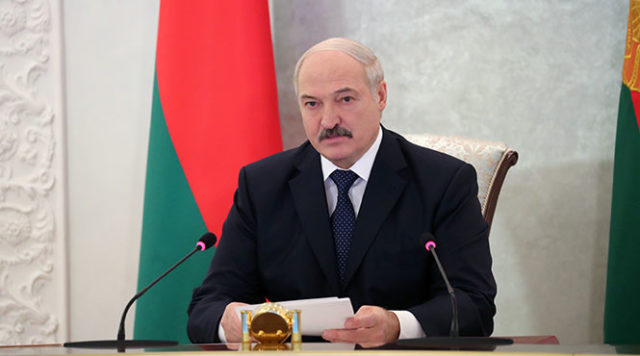
Belarus: The Art of Keeping a Distance
Publication: Eurasia Daily Monitor Volume: 15 Issue: 26
By:

“The world is one step from a global confrontation with unpredictable consequences,” declared President Alyaksandr Lukashenka at the meeting of Belarus’s Security Council. “Whereas Russia will bear the brunt of defending our common space, there is no understanding on the part of Russia’s leadership that we need to be strengthening the most vulnerable facets of our national armed forces together. One has to understand that Belarus is the main advanced post of the Russian Federation in the West” (President.gov, February 13). At the same time, Lukashenka averred that he does not see any alternative to Minsk as the venue for talks on Ukraine’s conflict resolution.
Adept at reading between the lines of political declarations emanating from Minsk, Yury Drakakhrust of Radio Liberty and Tut.by, discerns a divergence between form and substance in this particular case. On the face of it, Lukashenka pledges allegiance to Russia, but for all practical purposes, he is sending a message to the Western capitals. “Do you need Minsk the way it used to be, perorating about the monster of NATO creeping up to the borders of blue-eyed Belarus that is ready to lie down under your tanks? No? Then forget about moving the negotiations’ venue away from Minsk” and possibly approve of sending Belarusian peacekeepers to Donbas (Tut.by, February 14).
This reading of Lukashenka’s intentions may be on target. Primarily because in the increasingly geopolitical logic behind Belarus’s security concerns and dilemmas, maintaining Minsk’s role of a peace broker and having ties and arrangements with both geopolitical flanks is of existential importance (see EDM, February 14). Otherwise, it would be next to impossible to keep a safe distance between Belarus and its powerful eastern neighbor. Any new conflagration in Europe runs the risk of pushing Belarus into a still tighter Russian embrace. With this in mind, Belarusian pundits keep on invoking the idea of Helsinki-2, a platform for pursuing a broad international consensus on security in Europe reminiscent of the accord achieved by 35 countries in 1975 (Belarus Segodnya, February 3).
Keeping a distance, however, is more a delicate strategy and an everyday concern than an immovable target. As the crisis in Ukraine has demonstrated, any abrupt change in connections with Russia is dangerous, regardless of whether it is estrangement or a meeting of the souls. Whereas the latter implies losing your own identity or failing to acquire one in the first place, the former may surpass the ordinary people’s readiness to reckon with consequences and risks an open conflict.
On the one hand, Lukashenka is the only post-Soviet national leader, except Putin, who keeps on congratulating prominent Russians with reputations in the performing arts, established when the Soviet Union was around, with birthday wishes and condolences when they pass away. On the other hand, efforts are being made to ensure national allegiance of the ruling elite and its consolidation around genuinely Belarusian values. The former editor of the major government daily of Belarus, Pavel Yakubovich, confessed in his interview to the Polish publication Rzeczpospolita that he was conducting an information war with the chief activists of Russian TV propaganda, Vladimir Solovyov and Dmitry Kiselyov (Rzeczpospolita, February 11).
In his interview with Nasha Niva, a newspaper of the Belarusian opposition, Valery Voronetsky, now chairing the foreign relations committee of Belarus’s House of Representatives, averred that most Belarusian bureaucrats were patriots of the country and that Belarus’s history ought to be written in Minsk. Consequently, the upcoming (March 25) centennial of the Belarusian People’s Republic (see EDM, January 25) is an important milestone of Belarusian statehood—a confession that used to be taboo among Belarus’s officials (Nasha Niva, February 9). Alena Anisim, who chairs the Belarusian Language Society and is also a member of parliament (MP), agrees with Voronetsky. Although she encounters problems in spreading the Belarusian language in the public domain, Anisim, an opposition-minded MP, insists that a “trend of a serious attitude to a human being” is set at the very top of power (Svaboda, February 14).
Even the upcoming centennial of the still popular First Secretary of the Communist Party of Belarus from 1965 to 1980, Piotr Masherov, is now discussed from an unusual until now standpoint. First, it is mentioned that he might be a descendant of a soldier of the Napoleonic army, whose last name was Macherault. Second, Masherov’s father appears to have fallen victim to Stalinist purges. Third, during the war, the Soviet secret police was “even more suspicious than the Gestapo,” so partisan leaders like Masherov had a hard time proving their loyalty (Imhoclub, February 13). Finally, instances of Masherov’s disobedience to the Kremlin are now being hailed.
In sum, Belarus is becoming ever more Belarusian with each passing day. Those expressing judgment about it are best advised to take this into account as well as the delicate circumstances of its quest for informal independence.



